A common demand among the Arab Spring countries in 2011 was the call for justice and freedom; Yemen was no exception. In fact, the judicial system in Yemen is among the most corrupt and inefficient systems in the region. Although Yemen’s Constitution theoretically guarantees an independent judiciary, in practice the executive branch exerts considerable influence over judicial authorities. The country’s infrastructure, including its judicial institutions, has been severely damaged by the armed conflict that began in 2014, and the opposing parties to the conflict have divided the judiciary and its institutions, creating parallel systems that do not recognize each other’s legitimacy.
Rebuilding and implementing the Yemeni judicial system after protracted conflict will require carefully dealing with the new reality and enforcing the rule of law to maintain sustainable peace. This paper provides an overview of the judiciary prior to the conflict, discusses the most relevant provisions of the Draft Constitution, and explains how the ongoing conflict is further deteriorating Yemen’s judicial system. The paper concludes by highlighting the key challenges that can be expected in the post-conflict period, and recommendations for re-establishing the basis for a strong judicial system.
